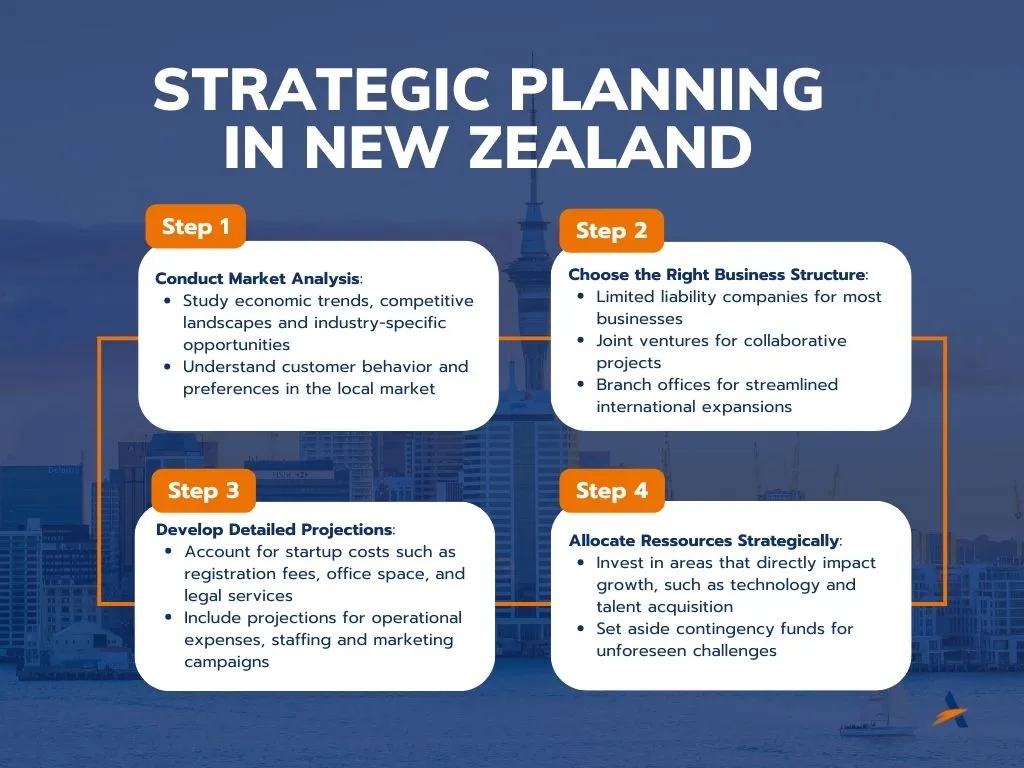As global business leaders seek new avenues for expansion, New Zealand consistently emerges as a top destination to start a business. Known for its business-friendly policies, stable economy, and strategic location in the Asia-Pacific region, New Zealand provides a fertile ground for international companies to grow their activity. This guide offers an in-depth roadmap for establishing and running a subsidiary in New Zealand, addressing both opportunities and challenges, and equipping you for success in starting a company locally.
The Appeal of New Zealand for International Businesses
New Zealand’s reputation as a business-friendly country is based on its strong regulatory frameworks and forward-thinking policies that support emerging companies.
The country has FTAs with over 60% of the world’s economy, including agreements with China since 2008, the UK, the EU, and multiple Pacific and Asian nations.
Consistently ranked in the top tier of the World Bank’s Ease of Doing Business index, the “nation of Kiwis” offers an environment favorable to foreign investment and entrepreneurship.
Key advantages include:
- FTAs (Free trade agreements): Through its active involvement in FTA’s, New Zealand has strengthened its economic environment, facilitating access to international markets and creating opportunities for new businesses. The country participates in the Regional Comprehensive Economic Partnership (RCEP), the world’s largest trade bloc, which includes China, Japan, South Korea, and ASEAN nations. These agreements significantly reduce tariffs and improve market access for various sectors, from agriculture to technology. New Zealand now competes with Australia as a strategic entry point to global expansion, even though both nations maintain multiple FTAs.
- Stable Political and Economic Environment: New Zealand enjoys a sustained political framework and economic stability as its democratic system delivers reliable policies which create long-term stability for businesses. Auckland stands out as the leading economic center of the country, generating 38% of its GDP. New Zealand relies on high-value service including industries, manufacturing, and tourism.
- Innovation incentives: New Zealand offers a 15% research and development (R&D) tax credit, encouraging businesses to invest in new technologies and processes. These incentives make the country particularly appealing for innovative companies and entrepreneurs looking to expand into the New Zealand business landscape.
- Strategic Location: Positioned in the Asia-Pacific, the country provides access to major regional markets like Australia, China, Japan and Pacific Islands. Its time zone advantage allows businesses to operate efficiently across both Asia and America, providing a unique bridge for companies looking to expand in these markets.
- High-Quality Infrastructure: Advanced digital connectivity, efficient transport systems, and robust utilities support seamless operations for businesses in New Zealand.
- Educated Workforce: Setting up a business in New Zealand is greatly supported by its talented and adaptable workforce. The country offers a pool of highly skilled Kiwis, ensuring that companies have access to qualified professionals who can contribute to their success and growth.
- Transparent Legal System: Clear regulations and strong enforcement mechanisms protect business interests, including intellectual property rights.
ALTIOS, with over 30 years of expertise in market analysis and local regulations, can help you identify the opportunities and overcome the challenges of setting up a business in New Zealand.

Process for Establishing a Subsidiary in New Zealand
The process of setting up a subsidiary in New Zealand is straightforward, supported by an online presence and digital systems that streamline compliance. Limited liability companies are the most common structure for those who want to start a business due to their simplicity and financial advantages. Here’s a breakdown of the process:
1. Choose the Right Business Structure
- Limited Liability Company (LLC): Ideal for most businesses, offering simplicity and limited personal liability. New Zealand’s tax system works via Look-Through Companies (LTCs), which transfer profits and losses directly to shareholders, in the same way that partnerships distribute profits among members. This method enables companies to benefit from tax advantages tailored to their specific needs.
- Branch Office: Suitable for companies wanting a lighter presence without incorporating locally.
- Partnerships or Joint Ventures: Useful for collaborative projects or shared investments, especially for small business ventures.
- Sole Trader: It is a common structure for those looking to start a business in New Zealand and is often used by freelancers or small-scale entrepreneurs.
2. Register with the Companies Office
- Create an account with the RealMe® login system to facilitate your business name registration. (RealMe® is a secure online login service used in New Zealand)
- Reserve a unique company name for $10 plus GST (Goods and Services Tax), it is a 15% tax added to most goods and services in New Zealand.
- Submit details about directors, shareholders, and the registered office address.
- Pay a $118.74 registration fee (plus GST) and submit director and shareholder consent forms within 20 working days.
Upon approval, you’ll receive a Certificate of Incorporation, which legally establishes your business.
For more information and to start the registration process, you will need to register for a New Zealand business number to the: Companies Office website
3. Register for Tax Purposes
- Get an IRD (Inland Revenue Department) number: This number is used to file your business taxes and is essential for running a business in New Zealand.
- Register for GST to ensure compliance as you grow your business. If you expect to make more than NZD 60,000 in a year, you must register for GST (Goods and Services Tax).
- Employer registration is crucial for running a business in New Zealand: If you plan to hire employees, you must register as an employer with IRD to handle payroll taxes and employee deductions.
Detailed information on tax registration and compliance with new business can be found on the official website: Inland Revenue Department website.
4. Meet Additional Licensing Requirements (If applicable)
- Certain industries, such as food production, healthcare, and export/import, require specific permits.
- Ensure compliance with environmental and safety standards relevant to your sector.
This structured approach simplifies the process and ensures businesses meet all legal and regulatory obligations, when setting up a business in New Zealand.
For comprehensive information on business regulations and policies in New Zealand, Visit the Ministry of Business, Innovation and Employment website for information on companies register.
Strategic Planning for Success
To succeed in New Zealand, careful strategic planning is essential. This includes conducting market research to understand local industry dynamics, customer behavior, and competitive landscapes. For example, the retail sector requires in-depth knowledge of consumer preferences, while the technology sector demands an understanding of emerging trends and government policies.
Equally important as mentioned earlier, choosing the right business structure. While limited liability companies are the most popular choice, some businesses might benefit from partnerships, joint ventures, or even operating as a branch of their parent company. Each structure has unique implications for taxation, liability, and operational flexibility.
Financial planning also plays a critical role. Businesses should develop detailed budgets that account for registration costs, operational expenses, and marketing investments when starting a company. Allocating resources effectively ensures smooth operations and sets the stage for a business plan focused on long-term growth. For businesses entering the New Zealand market, leveraging the support of a trusted partner like ALTIOS can provide a competitive edge. Our strategy solution combines deep market insights with practical experience to help companies make informed decisions, ensuring their strategy aligns with both business goals and local market conditions.

Operational Foundations
Building a solid operational foundation is crucial for a subsidiary’s success. Location is often the first critical decision. Urban centers like Auckland and Wellington offer access to skilled labor and infrastructure, while regional areas may provide cost advantages and proximity to niche markets.
Technology infrastructure is just as important. Businesses must comply with New Zealand’s privacy laws and implement robust IT systems to safeguard sensitive information. A secure and scalable technology setup not only ensures regulatory compliance but also builds customer trust.
Another vital aspect of starting a business is setting up a local bank account. This is essential for managing payroll, supplier payments, and daily transactions. Companies must comply with anti-money laundering (AML) regulations, providing detailed documentation to verify their business structure and ownership.
Cultural Integration
Adapting to New Zealand’s business culture is essential for building lasting relationships. Kiwis value egalitarianism, directness, and informality in professional interactions. Understanding these cultural nuances can make a significant difference in fostering trust and collaboration.
Key Cultural Considerations
- Punctuality is highly valued in business settings.
- Meetings often involve open dialogue, with emphasis on mutual respect and practical solutions.
- Networking through local industry events and trade fairs can help establish meaningful partnerships.
Building strong connections with local stakeholders enhances your reputation and creates opportunities for growth.
Compliance and Governance
Compliance with New Zealand’s legal requirements is essential for maintaining smooth operations. Under The Companies Act 1993 outlines the legal framework for those looking to incorporate your company in New Zealand. Under the Companies Act 1993, directors have defined responsibilities, including maintaining accurate financial records and filing annual returns with government agencies.
Large companies and subsidiaries of overseas firms may have additional reporting obligations, such as preparing financial statements that meet international accounting standards. Staying up to date with these requirements is critical for avoiding penalties and building a strong reputation in the market. For companies unfamiliar with these processes, ALTIOS expertise in local regulations and streamlined setup strategies can help ensure everything is completed efficiently and in compliance with New Zealand law, reducing the administrative burden.
SMB’s that have successfully set up in New Zealand
Ecostore: Sustainability at Scale
Founded in 1993 in a Northland eco-village, Ecostore grew from a small eco-friendly product maker to an international brand. Relocating to Auckland enabled access to skilled labor and infrastructure, despite higher costs. By prioritizing sustainability and compliance with strict environmental standards, Ecostore expanded into international markets, adapting to diverse regulatory and consumer demands while maintaining its core values.
Little Creatures Brewery: Crafting a Local Presence
Australian-born Little Creatures Brewery expanded into New Zealand by transforming a historic seaplane hangar in Auckland into a brewery and dining space. The company overcame regulatory hurdles and built brand recognition by collaborating with local suppliers and offering unique customer experience. These efforts solidified its position in New Zealand’s competitive craft beer market.
Key Insights for Success
Both Ecostore and Little Creatures Brewery highlight the importance of:
- Strategic location decisions for starting a business, balancing costs and market access
- Adherence to local regulations and quality standards.
- Building strong local partnerships while staying true to core brand values.
To conclude, New Zealand’s stable economy, transparent regulations, and strategic location offer immense opportunities for global businesses. Success in this market depends on careful planning, local compliance, and strong partnerships. By leveraging expert guidance, such as what provided by ALTIOS, businesses can confidently face the complexities of expansion and achieve sustainable growth.
Ready to explore the opportunities New Zealand has to offer? Together, let’s set up your expansion project!








